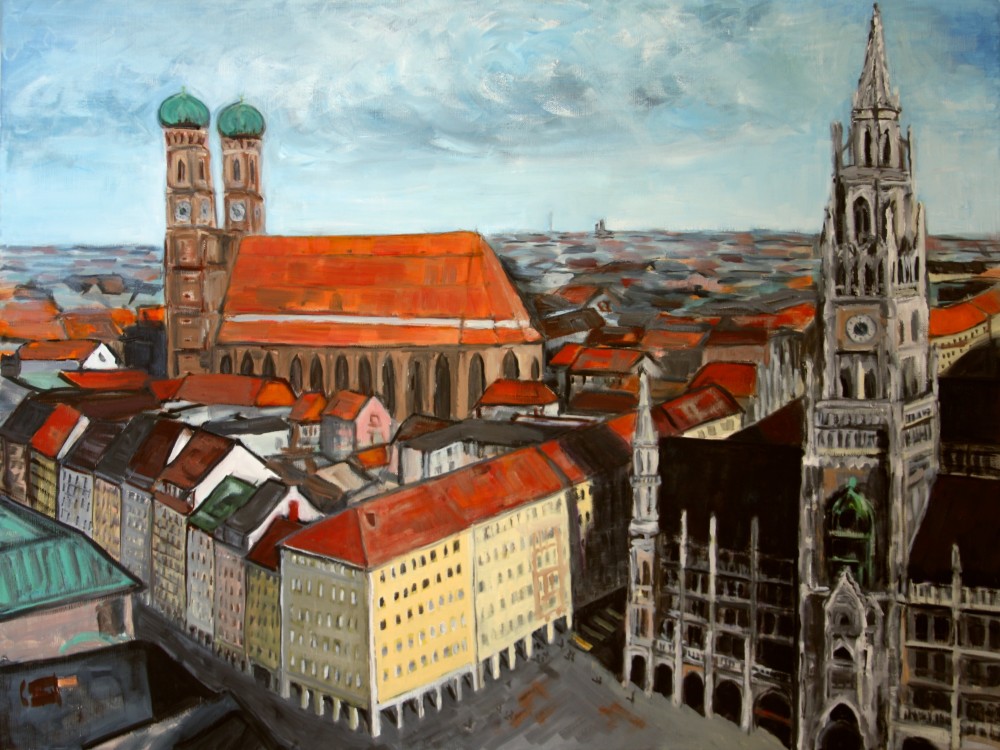
Today we have a guest post by Dana Newman, writer and expat vlogger at Wanted an Adventure. Read her tips and then run off to live in Munich. You know you want to.
Munich:
- Bavaria’s capital, but really more a quaint, sprawling village than a bustling city.
- Home of Oktoberfest.
- Headquarters of the Biergarten (if you don’t know what true beer gardens are yet, believe me–they’re a good thing).
- Site of the world’s largest urban surfing location.
- Boasts 6 Urban Naked Zones in parks around town.
- Home to the 1972 Olympic stadium, still used today for concerts and athletic events.
- A hop, skip, and a jump away from Neuschwanstein Castle, the Alps, Salzburg, and the Romantic Road.
Who wouldn’t want to live there!? Someone without a job, I suppose. Because all the nude sunbathing and social beer drinking in the world won’t help you settle into life in this splendid Wunderland if you can’t afford your relatively high-priced apartment, not to mention can’t get a visa to stay in town. But I’m here to offer up on a silver platter all the information I’ve acquired over the years in regards to the different options foreigners have for earning a living here in Paradies.
Scenario 1
You’re not from an EU Member State, you don’t speak a lick of Deutsch, and you don’t have a specialized, highly trained skill (like say, aeronautical engineer with 10 years work experience).
First of all, whatever your glamorous international jetsetting career expectations are, lower them. Nope, even lower. Lower still! There you go; that’s about right. Okay, okay–sign up for a German course and you can raise them. Slightly.
Armed with at least a primitive knowledge of the German language, here are your options:
- English teacher
- Preschool teaching assistant (Kinderpfleger)
- Au pair
Each of these employment options does more than just pay the bills; they all provide an expat with the opportunity to get that oh-so-coveted residence permit.
To get a job as an English teacher, it’s helpful to be a native speaker. That being said, I have several non-native English speaking friends whose knowledge and grasp of English grammar and usage rivals mine at times and who have had very successful English teaching careers. But regardless, the truth of the matter is that clients often prefer to learn from a native speaker and it’s, therefore, easier to land a job as one. In addition, a college degree would open many doors, as would a TEFL certification.
A by no means exhaustive list of ESL schools in Munich:
As for preschool teaching assistant, Munich abounds with private bilingual preschools/kindergartens for children aged 3-6. Because these schools are private you don’t need to have the state teaching qualifications that would be required in a German public school. The downside: neither do any of your co-workers.
Here’s a start for your search:
(Yes, the preschools in Munich get cute with their names.)
Last but not least, au pair. This job option comes with a BIG asterisk: to obtain an au pair visa in Germany, you cannot be older than 26! That’s not say that you can’t be an au pair in Germany after age 26, but your au pair visa application must be filed with the government before you hit the big two-seven.
For more information on what it means to be an au pair in Germany, check out this PDF issued by the Bundesagentur für Arbeit: Working as an au pair for German families Updated: 01.01.2014.
Also, AuPairWorld provides a step-by-step breakdown of the process.
Scenario 2
Well, what do you know! Look at that–you do have a specialized skill. That’s great…presuming of course that your honed craft is more along the lines of engineering or mathematics–something Munich might be interested in–than, say, paleontology.
As of August 1, 2012, Germany implemented the European Union’s Directive on Highly Qualified Workers with the goal of making it easier for qualified workers from non-EU Member States to move to Germany. In connection with this directive is the EU Blue Card, a relatively new residence permit.
Why is this significant? Prior to all this, companies needed to give first preference to German citizens, second preference to EU citizens, and, last but not least, if nobody else was qualified, they could give the job to a foreigner-foreigner.
However, don’t go buying your plane ticket and packing your Dirndl/Lederhosen just yet! If you haven’t heard, Germany is a bureaucratic nation. They love their red tape. I wouldn’t be surprised one bit to find out that each German baby is gifted a couple rolls of the stuff on their first birthday. So as much as they are trying to make it easier for so called “third-country workers,” according to a Spiegel Online article from December 2013, “Tepid Welcome: Germany Struggles to Lure Skilled Workers” by Maximilian Popp and Janko Tietz, Germany still has a few kinks to work out in the process.
For more information, check out this leaflet issued by the Bundesagentur für Arbeit: Employment of Foreign Workers in Germany.
Scenario 3
Let’s say you’re from an EU Member State or you’re married to a German and, therefore, have a German work permit.
Of course it can always be somewhat daunting to hunt around for a job, especially when you’re in a foreign country. But take solace in knowing that the path ahead of you contains far fewer obstacles and debris than for those in the two previous categories. So, yay for that!
If you’ll be applying to international companies (which I highly recommend if you’re planning to use your proficiency in the English language as the foundation for your desirability) an English-language CV, I’ve found, is generally sufficient. If your German is good enough to write a German-language CV, go for it. If it’s not, it’s a waste of time as well as false advertising to get someone to write the document in German for you.
Not interested in working in an office? Since you already have a work and residence permit, other options such as bartender, server, or cafe barista are open to you. Just one point here: in many such establishments it isn’t uncommon for employees to be hired under the €450 mini-job basis and then paid additional wages under the table. This of course is illegal, but that doesn’t stop it from being common practice.
General Tips
Coming as a shock to me when I first found out, it’s the norm for applicants to include a photo of themselves when sending in their CV and cover letter to potential employers. If you provide a nudie, as comfortable as Bavarians are with bare skin in the summer, it’ll come as a shock to them.
Check out ToyTownGermany, an expat site with a classifieds section as well as forums that can generally offer pretty good answers to most questions.
CV vs. resume–what’s the deal here? A CV, or curriculum vitae, is the European standard, and a resume is the American format. So then the question is, if you’ve got everything nice and tidy in a resume, should you switch it to a CV style? And the answer is: it’s up to you. It’s been my experience that in Munich, especially at international companies, they’re pretty flexible. Resume or CV, employers seem to be more interested in the content of the document than how it’s formatted. But that’s just what I’ve witnessed! Could happen that you apply to a formatting stickler and that person rejects you simply on the basis of your resume layout. Perhaps better safe than sorry is the appropriate proverb here, even if it does mean a little extra work.
 Dana Newman is an expat YouTube vlogger and writer whose debut novel, Found in Prague
Dana Newman is an expat YouTube vlogger and writer whose debut novel, Found in Prague, is based loosely on her experiences living in the Czech Republic when she first moved to Europe in search of her roots. For the inside scoop on expat life in Germany (such as what it means to date the locals and why the German sauna culture is like mayonnaise) as well as travel videos from around the world, check out and subscribe to her Wanted an Adventure YouTube channel. She can also be found on Twitter @WantedAdventure, sharing her international thoughts and musings in the most concise form the Internet has to offer.
For more tips about working in Europe, check out our posts on how to find a job in Europe as an expat and resources for finding work in Germany.